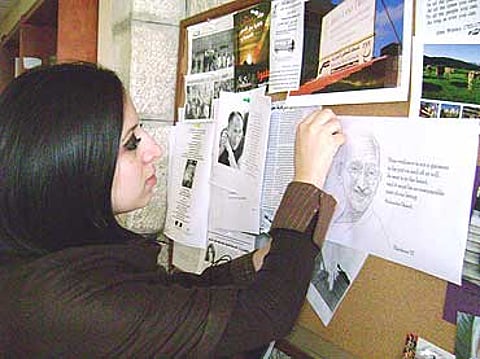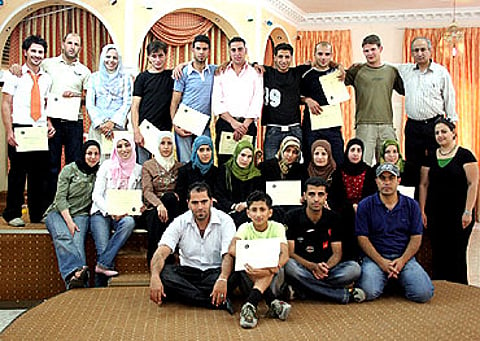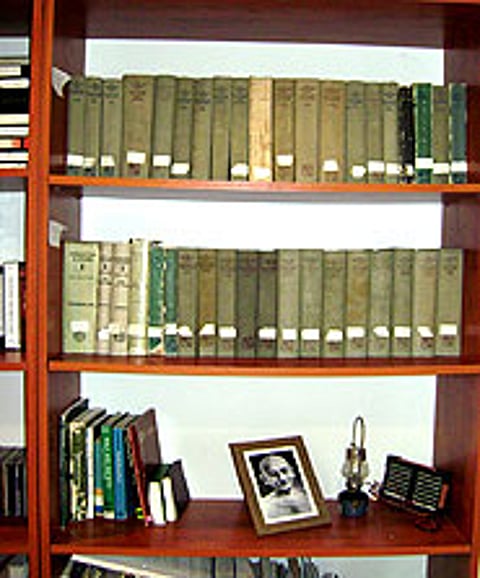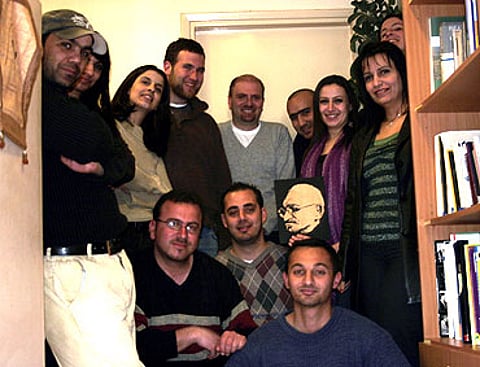Gandhis Of Olive Country
Another path to peace? Palestinians revel in Gandhi and the nonviolent struggle.

"The history of Palestinian NV is long and courageous, but not well-known," says Hirschfield, a writer's writer whose discovery of the Palestinian NV movement has developed into an intensely personal passion, leading him all the way from New York's Lower East Side to the towns and alleyways of Palestine. "It is not quite a story of ahimsa, not in the spiritual sense. Usually, NV activism has been used here as a way to an end. But," he adds, "certainly, there are many who choose NV because it is just that—nonviolent."
We are joined at the Ramallah ice-cream shop by Hizami Jabri, a 36-year-old father of five young girls, who has served two terms in Israeli jails and was shot in his shoulder during a violent agitation. "I started to ask myself, how could I have a good life? How could my people have a good life? This violence, it cannot bring a good life," says Jabri, a member of the Palestine Authority's preventative security force by day, an NV trainer for the NGO MEND (Middle East Nonviolence and Democracy) after hours. He tells us, as many do, that the success of NV in India gives him strength, inspiration. There is shy pride in his hazel eyes when he says, "My daughters have taught NV conflict resolution to all the other kids in the neighbourhood. They are a new generation."

Hirschfield tells us of another NGO called Combatants for Peace, which unites Israeli and Palestinian ex-fighters in NV actions against the Israeli occupation. One Palestinian leader of this group, Bassam Aramin, an ex-Fatah fighter who served years in Israeli jails, lost his 10-year-old daughter to a stray Israeli bullet last spring but has not changed his mind about his path; Aramin's Israeli counterpart, Arik, lost his sister in a Palestinian suicide attack. Hirschfield has written about these men in one of his powerful essays: "They are fighters wanting to reframe the fight, wanting a future for their children emptied of the wall posters of martyrs."

We have reached Bethlehem, the birthplace of Jesus Christ, through a massive and intimidating checkpost. We are visiting the Holy Land Trust (HLT), one of the several Palestinian NGOs dedicated to strengthening and promoting NV on the 'West Bank'. In the hallway, a billboard carries a photo of Mahatma Gandhi with the quote: "Non-violence is not a garment to be put on and off at will. Its seat is in the heart, and it must be an inseparable part of our being." On the hallway bookshelf, a well-worn set of Gandhi's writings, brought back by Mubarak Awad—called Abu Gandhi (see box)—from his India yatra some 25 years ago. "I do not believe Gandhi would agree to definitions such as 'Gandhian'," says Sami Awad, Mubarak's nephew and the executive director of the HLT. "This term holds a sense of division, separateness. But the HLT is founded on the philosophy and the work of Gandhi—in the political, social and spiritual sense." The windows look out over a valley where a large, clustered Israeli settlement blocks the view of the olive groves on the ancient white rock slopes.
Olive trees in Palestine have special significance—they give their first fruit after 70 years. When one plants and tends to a new olive tree, it is an act of unselfish love towards future generations. Palestine is covered in olive groves, but thousands have been cut to build the Wall. Replanting new olive trees has become a major form of civil disobedience, along with rebuilding demolished houses, demonstrating at the Wall, and boycotting Israeli goods. "I am often reminded of the famous quote by Gandhi," says Awad, "'First they ignore you, then they ridicule you, then they fight you, then you win.' The great thing about this quote is the fact that Gandhi did not say—then they fight you, then THEY LOSE. Gandhi said, then YOU WIN. In NV, there are no losers, only winners."

This good news remains under-reported, even in Israel, where there is a majority support for an independent Palestinian country. Three years ago, 'wealthy American businesspeople' sponsored The Gandhi Campaign: the Hollywood film, Gandhi, dubbed in Arabic, was shown in towns and villages across Palestine and Gaza, with the hope that it will inspire NV. (Ben Kingsley, the movie's star, was guest of honour at the premiere). The next day, Avishai Margalit, a writer for Israel's Left-leaning newspaper Haaretz, asked Palestinian friends if there ever could be a Palestinian Gandhi, and why Mubarak Awad had 'failed'. "Nonviolent struggle is perceived in Palestine as unmanly," his friends told him. "There is a strong belief that what was taken by force must be regained by force." The 'left-wing' Israeli blogger Ran HaCohen wrote in response: "The Palestinians don't have to watch the Gandhi film. There are thousands of Palestinian Gandhis out there. Whole villages that demonstrate daily and peacefully against the robbery of their land and livelihood. Still, the only voice we hear is the voice of commentators and movie stars wondering, 'Where is the Palestinian Gandhi?'"
Hirschfield would agree. He is writing his book about these remarkable people, and about his mother as well, a deeply orthodox Jew who lost 25 members of her family in the Holocaust. "My mother was appalled by the violence in the world. She taught me that I must use my life to my power to heal this world. Israel's actions in Palestine fill me with anger, and with immense sadness." He is one of many, on both sides of the grey wall, dedicated to tearing it down by being, as Gandhi famously said, the change they want to see.
Tags